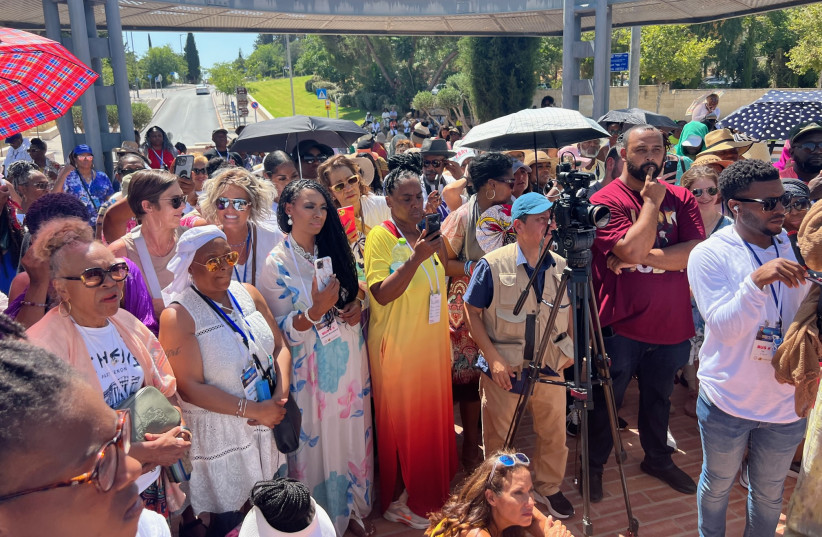A sea of passionate Black Christians marched down Martin Luther King Street in Jerusalem Wednesday afternoon, fulfilling their leader's vision 55 years after his death.
Dr. Martin Luther King Jr. was scheduled to bring a tour of thousands of African Americans to Israel in 1967 for a spiritual mission, where records show he would preach to them on the Mount of Olives and pray with them at the country's holy sites in Jerusalem and the Galilee.
In a release King published before his trip, he called Israel the "land from which our faith burst forth." In a speech, King said Israel was "one of the great outposts of democracy in the world" and a marvelous example of "how desert land can be transformed into an oasis of brotherhood and democracy."
However, King's plans to bring his followers were never fulfilled. First, the Six-Day War broke out. Then, less than a year later, he was assassinated.

Martin Luther King's legacy in Israel
King had traveled to Israel with his wife, Coretta Scott King, in the winter of 1959, visiting then divided Jerusalem, Hebron, Bethlehem and Jericho. Many believe this trip influenced his famous "I've been to the mountaintop" speech, eerily delivered the night before his murder.
"Like anybody, I would like to live a long life. Longevity has its place. But I'm not concerned about that now. I just want to do God's will," King recited. "And He's allowed me to go up to the mountain. And I've looked over. And I've seen the Promised Land. I may not get there with you. But I want you to know tonight that we, as a people, will get to the promised land!"
As such, more than 500 Black people marched on Martin Luther King Street in Jerusalem in honor of their leader on Wednesday. The walk highlighted their extensive efforts to connect to the Holy Land and rekindle the historic bond between the Black and Jewish communities forged during the Civil Rights Movement but wrought with tensions in recent decades.
Covenant Daughters International Ministries organized the event in collaboration with Joshua Giles Ministries.
"We are fulfilling the dream of Dr. Martin Luther King to bring African Americans to Israel," said Cathelean Steele, the first lady of the Southern Christian Leadership Conference (SCLC), a civil-rights organization co-founded by King. "Our job is to bring us back together because of the history we share."
"What is important for us to understand is that King and his wife had been here, and he wanted us, as a people, to come here to the Promised Land," said Bishop Glenn Plummer of the Israel of the Church of God in Christ (COGIC) denomination, who moved to Israel with his wife, Dr. Ruth Pauline Plummer, in 2019. COGIC First Lady Ruth Plummer runs Covenant Daughters International Ministries.
"I don't think this many Black Americans have walked on Martin Luther King Street before," Glenn Plummer said. "It is happening now. We're here to celebrate Israel. We are here to bless Israel."
The march on Martin Luther King Street, which culminated at the road's central rotunda where Glenn Plummer was speaking, marked the conclusion of a 10-day mission to Israel of 150 influential Christian women leaders, responsible for upwards of a combined million congregants and followers; Giles' tour had around 400 travelers. Coined by Ruth Plummer as the "Women of the Bible Tour," the pilgrimage from July 18 to 27 brought Black women mainly from the US to Israel to explore its culture, typography and history through the verses of the Old and New Testaments.
Plummer said the primary emphasis of the trip was to empower female leaders to find their place of influence in relations between Christians and Israel.
"This visit is designed to empower and mobilize women to study the Jewish roots of their faith, the lives of historical women of the Bible, and connect with contemporary Israeli women. In developing this understanding and these relationships, we also combat antisemitism," Plummer said.
In addition to visits to religious sites, the women met with MK Sharren Haskel, co-chair of the Knesset Christian Allies Caucus, and first lady Michal Herzog at the President's Residence. Steele and Archbishop Ruth W. Smith of Light of The World Christian Tabernacle International Association, which has a membership of over 200,000, co-hosted the trip.
Smith told The Jerusalem Post she sees "more that bonds than separates" the Jewish and African American communities. She had been to Israel several times in the 1980s and 1990s when she ran an underground mission to help share the Gospel with African migrants, many of whom she helped start new lives abroad or in Israel. Today, she said, she aims to help debunk the myths about the Jewish State shared in the mainstream media and to halt growing hate against Israel among the Black community.
Steele, who was close with the Kings, said that the Civil Rights leader frequently linked the Jewish struggle to overcome antisemitism to the battle of the African American community to overcome racism.
King's "heart went out to the Jewish people," who were killed because of their faith, and often related it to his own people's plight: Blacks who were "lynched and killed in America just because of their race," she told the Post.
As a former history teacher, Steele spoke about educating the young generation.
"I believe that the future depends on knowing our history," Steele said. "If you do not know your history, then you are due to repeat your past."
